Research Office News
Pages
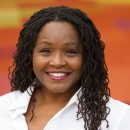 Yatesha Robinson Selected as a 2023 Michigan Road Scholar
Yatesha Robinson Selected as a 2023 Michigan Road ScholarField Faculty Yatesha Robinson has been selected as a 2023 Michigan Road Scholar. The annual Michigan Road Scholar Tour is a five-day traveling seminar through the state of Michigan for U-M faculty. The tour provides a unique opportunity for faculty to learn more about the state’s economy, government, geography, educational systems, history and the diverse communities and cultures. The experience encourages public service and collaboration for the benefit of all Michiganders. This year’s tour takes place during the first week of May.
- May 16, 2023
- Learn more »
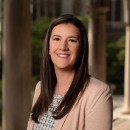 Lindsay Bornheimer Invited to Speak at the Albert J. Silverman Conference
Lindsay Bornheimer Invited to Speak at the Albert J. Silverman ConferenceAssistant Professor Lindsay Bornheimer was an invited faculty speaker at the Albert J. Silverman Conference in the Department of Psychiatry this week. She spoke about her study in a presentation on "Adapting a Cognitive Behavioral Suicide Prevention Treatment for Adults with Schizophrenia Spectrum Disorders in Community Mental Health.”
- May 9, 2023
- Learn more »
 Laura Sanders Discusses Animal-Assisted Therapy and Social Work
Laura Sanders Discusses Animal-Assisted Therapy and Social WorkLecturer Laura Sanders’ work with animal-assisted therapy (AAT) at her farm is featured in Crazy Wisdom Journal. “Instead of vegetables, we produce mental health,” she says.
Sanders describes her approach to AAT and how she uses it to teach relationship-building with social work students.
- May 9, 2023
- Learn more »
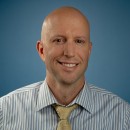 Matt Smith’s Research Cited in MIT Technology Review Article on Virtual Reality
Matt Smith’s Research Cited in MIT Technology Review Article on Virtual RealityProfessor Matt Smith’s research was cited in the MIT Technology Review on the potential of using virtual reality as a therapeutic tool, specifically for incarcerated individuals. Smith originally developed Molly, a virtual-reality tool for job interview training, for underserved groups. Molly was used in a pilot program with 44 men involved with the justice system. The findings showed that 82% of those who used the tool landed a job within six months of being released, compared with 69% of other program participants.
“Above just the employment rate, those that interviewed with Molly had stronger interview skills over time, greater reductions in interview anxiety over time, and greater increase in motivation to interview over time,” said Smith.
- May 9, 2023
- Learn more »
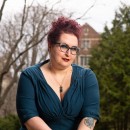 Shanna Kattari Quoted in USA Today on Anti-Trans Rhetoric & Laws
Shanna Kattari Quoted in USA Today on Anti-Trans Rhetoric & LawsAssociate Professor Shanna Kattari is quoted in USA Today on the recent negative attention and laws in the U.S. targeting transgender people. "All of this anti-trans rhetoric is absolutely about power and control, though some people may also hate trans people," says Kattari, "We are seeing the pendulum swing back in response to all the progress towards equity and justice that has been made over the past decade or so."
- May 3, 2023
- Learn more »
 Olivia Chang Named 2023 Promising Scholar by ResilienceCon
Olivia Chang Named 2023 Promising Scholar by ResilienceConPhD student Olivia Chang is the recipient of the ResilienceCon 2023 Life Paths Promising Scholars Award. This competitive award is presented to a small number of current students attending ResilienceCon who are conducting high-impact resilience-focused research that focus on under-served or disadvantaged communities.
- April 19, 2023
- Learn more »
 John Tropman Writes New Book on Leading Efficient Meetings
John Tropman Writes New Book on Leading Efficient MeetingsProfessor Emeritus John Tropman’s new book, “Fixing Broken Meetings: A Manual on Meeting Rotten-osity, Deleterious Decisions, and Ineffective Implementation,” examines the myriad ways in which meetings regularly fail and how individuals and organizations can produce efficient meetings that lead to effective decision making. The book serves as a resource for courses and programs in business and organizational behavior, as well as for anyone interested in improving the functionality of meetings within their organizations.
- April 11, 2023
- Learn more »
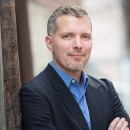 Luke Shaefer Discusses Unemployment Benefits on Marketplace
Luke Shaefer Discusses Unemployment Benefits on MarketplaceProfessor Luke Shaefer spoke with Marketplace about the recent report showing that only 25 percent of those who were out of work in 2022 applied for unemployment benefits. “There is undoubtedly a set of people who actually are eligible for benefits and should be getting them,” said Shaefer, who calls unemployment benefits “the most arcane and complicated” government program.
- April 11, 2023
- Learn more »
 Lauren Whitmer Successfully Defends Dissertation
Lauren Whitmer Successfully Defends DissertationLauren Whitmer, Joint PhD in Social Work and Anthropology, has successfully defended her dissertation entitled "Ay Amiga, ¿Qué Puedo Hacer? Oh Friend, What Can I Do?: An Ethnographic Analysis of How Socio-Cultural and Structural Factors Shape Help-Seeking Relationships for Intimate Partner Violence in Lambayeque, Peru." Her committee included Beth Glover Reed (co-chair) and Richard Tolman.
- April 4, 2023
- Rebeccah Sokol Named 2023 Public Engagement Faculty Fellow
Assistant Professor Rebeccah Sokol has been named a 2023 Public Engagement Faculty Fellow. The university launched its Public Engagement Faculty Fellowship program in 2020 to help faculty bolster their knowledge and skills, and also reflect on how public engagement aligns with their scholarly identity. The effort includes creating an interdisciplinary, intergenerational learning community, as well as encouraging recognition of and experimentation with all forms of public engagement.
- April 4, 2023
- Learn more »